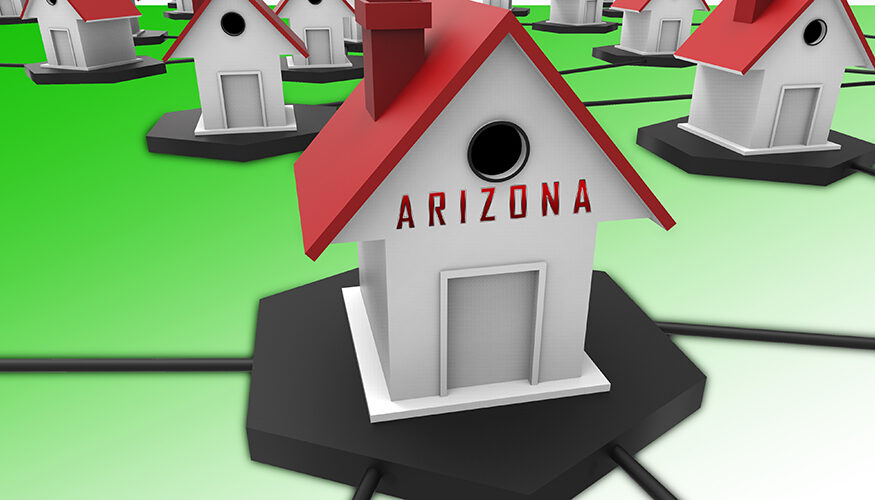Bill would allow commercial buildings refurbished into housing
Jakob Thorington Arizona Capitol Times//February 8, 2024//
Bill would allow commercial buildings refurbished into housing
Jakob Thorington Arizona Capitol Times//February 8, 2024//
A bipartisan housing bill is moving through the state legislature that would allow commercial properties to be redeveloped into housing units without a rezoning application.
Lawmakers passed the bill through the House Commerce Committee 7-3 on Tuesday, with a handful of Republicans voting against the bill.
Under the bill, municipalities would be required to allow multifamily residential development or adaptive reuse development of commercial buildings. These reused zones must meet the maximum residential density allowed under municipal zoning ordinances.
“We all recognize we’re facing a problem with a lot of commercial buildings that are laying empty now,” said bill sponsor House Majority Leader Leo Biasiucci, R-Lake Havasu City. “Let’s allow companies to come in and try to repurpose these, whether it’s multi-housing apartments, condos – and try to do that in a faster manner than the usual process.”
The measure, House Bill 2297, has three Democrats as cosponsors including Rep. Analise Ortiz, D-Phoenix, who is one of the most vocal advocates for housing policy reform in the House.
Ortiz said she often hears from constituents in her district of west Phoenix, Maryvale and Glendale that they want to see commercial properties that are no longer in use be converted into housing.
“People want all kinds of housing including mixed use housing … a coffee shop at the bottom and the housing on top. These are the types of living situations that around the world, not just around the country, make great communities,” Ortiz said.
Former Democratic state representative and architect Christian Solorio also spoke in favor of the bill and said he’s been involved in adaptive use projects in his professional career that could have been streamlined and proceeded more quickly had this bill been in place. He estimated the bill could reduce the time it takes to rezone a building from eight to four months.
“This bill isn’t going to be as massively transformative as some of the other legislation heard around this subject, but again, it’s another one of the tools in the toolbox and we’re at a point where we really need to use every single one that we can,” Solorio said.
But not every empty commercial property is suddenly going to be converted into housing, Solorio said. He explained during the House committee hearing that many commercial buildings aren’t compatible for housing due to a building’s depth and width.
One type of property that could be converted into residential housing are hotel and motel buildings since they already have plumbing infrastructure required for residential lots, Solorio said.
HighGround Public Affairs Consultants lobbyist Nick Ponder opposed the bill on behalf of several cities, including Phoenix, Tucson, and Paradise Valley. He said cities are concerned that the bill doesn’t specify that commercial properties must be empty or abandoned.
Cities also oppose the bill because they may not be able to plan water and sewer infrastructure around maximum density zoning allowed under the bill.
“We understand the need for more housing, but we think it’s incredibly important that the legislature also understand the importance of smart, municipal planning,” Ponder said.
The League of Arizona Cities and Towns is also opposed to the bill. Attorney Frank Cassidy, who represents the League, said the bill is a “blanket” solution that might put high density buildings in places where communities don’t want them or where they don’t mesh with existing land uses.
The Arizona Property Rights Protection Act also requires the state to pay to remove development entitlements, and Cassidy asked lawmakers to allow cities to choose candidates for redevelopment.
“You’re going to have a mess and it’s going to be a mess that you can’t fix with future legislation alone,” Cassidy said.
Rep. Justin Heap, R-Mesa, expressed a similar concern with the structures that will be built if the bill becomes law and said he believes it would result in large apartment complexes being built instead of smaller housing units.
“We are trapping people in rented apartment buildings, and this is actually I think quite disruptive,” Heap said. “Renters come and go and it’s hard to build a community or a neighborhood around rented apartments.”
Heap said he would prefer to see smaller units that people buy to build housing equity, such as condominiums and duplexes.
Rep. Justin Wilmeth, R-Phoenix, agreed with Heap but recognized the need for all types of housing in the state. He said the bill could be a head start for a world where commercial real estate is diminishing.
Wilmeth also questioned how much commercial real estate will be used in the future with the rise in online shopping and work from home jobs.
“If people want to live along Central (Avenue) and a 20-story apartment complex, that’s great, let’s build it. If people want to live in a condo with a little backyard for their dog, great, let’s build it,” Wilmeth said.



















